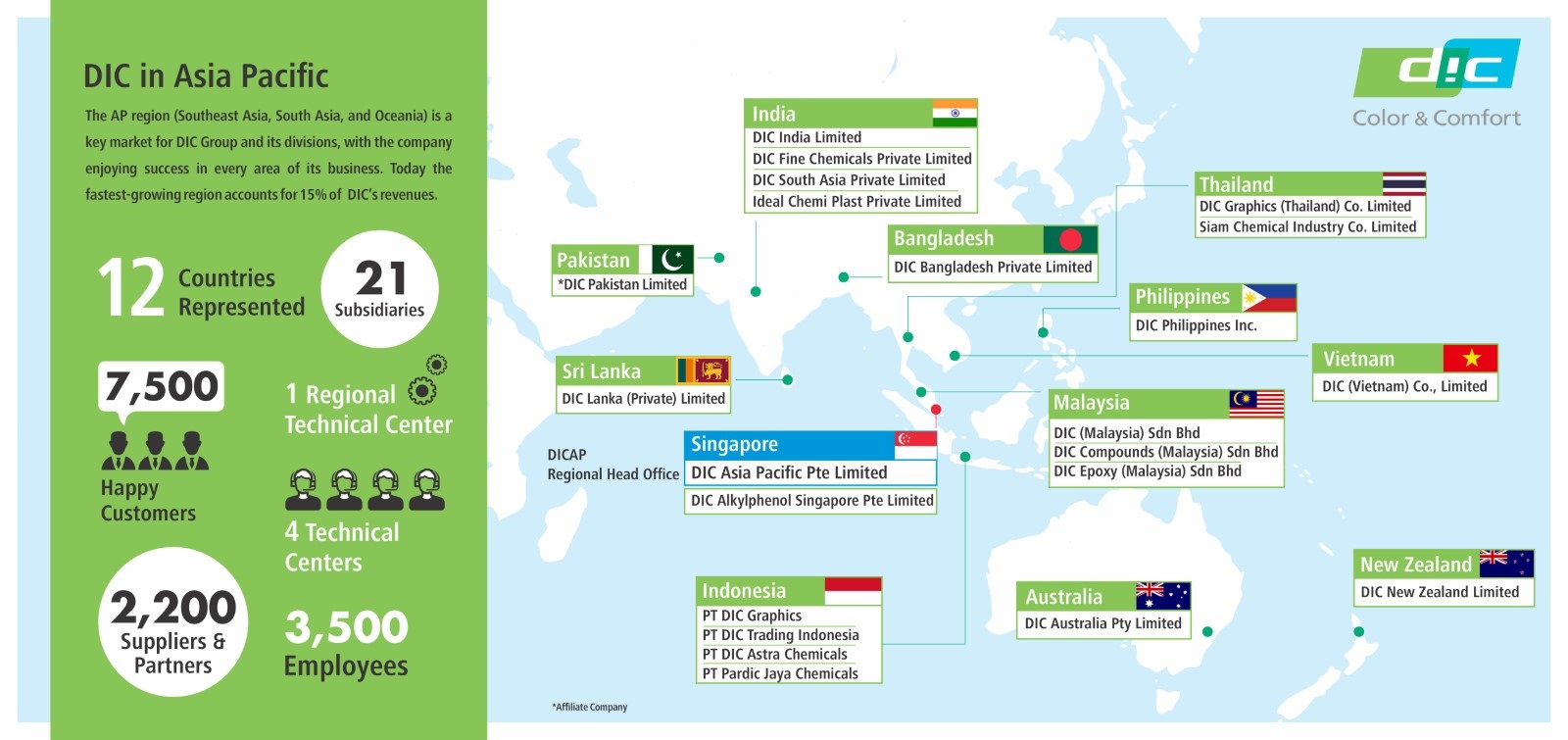News
-
Dec. 11, 2025 Exhibition & Event News Release DIC to Exhibit for the First Time at SEMICON JAPAN 2025, One of the World’s Largest International Semiconductor Industry Trade Shows
-
Dec. 8, 2025 Sustainability [Vision Watch] DIC’s Global Training is Empowering People, Driving Sustainability
-
Dec. 5, 2025 Exhibition & Event News Release DIC to Participate in Leading Global Technology Trade Show CES 2026
in the United States -
Nov. 27, 2025 Sustainability News Release The DIC Group Receives Third-Party Certification that the Methodology It Uses
to Calculate Product Carbon Footprint Conforms with International Standards -
Nov. 25, 2025 Exhibition & Event The special CHINACOAT page has been published
-
Sep. 10, 2025 Business & Product News Release DIC Develops GELRAMIC™ Endothermic Pad Material that Prevents Battery Fires from Spreading
-
Aug. 1, 2025 Business & Product We have renewed the top page of our Functional Products business and product site.
-
Jan. 6, 2025 Business & Product DIC Launches Special Website for New Multicopter Drone HAGAMOSphere™
-
Nov. 6, 2024 Business & Product News Release DIC and FPCO Achieve the Closed-Loop Recycling of Colored and Patterned Foamed Polystyrene Food Trays Using Material Recycling
-
Oct. 10, 2024 Business & Product News Release DIC and Unitika Collaborate to Develop a Specialty PPS Film with Low Dielectric Properties Suitable for Use in a Key Material for Millimeter-Wave Printed Circuit Boards and Millimeter-Wave Radar
-
Nov. 13, 2025 Management & IR News Release DIC Group Announces Organizational Reform and Executive Appointments Effective January 2026
-
Nov. 11, 2025 Management & IR News Release Sun Chemical Expands Perylene Pigment Capacity in Ludwigshafen to Support Customer Growth
-
Sep. 19, 2025 Management & IR News Release DIC Plans Sale of Owned Works of Art via International Auction
-
Sep. 2, 2025 Management & IR News Release DIC Group Publishes the English-language version of DIC Report 2025 Integrated Report
-
Aug. 19, 2025 Management & IR News Release New Sustainable Production Facility for Coatings for Direct Food Contact Materials Is Established in Indonesia
-
Dec. 8, 2025 Sustainability [Vision Watch] DIC’s Global Training is Empowering People, Driving Sustainability
-
Nov. 27, 2025 Sustainability News Release The DIC Group Receives Third-Party Certification that the Methodology It Uses
to Calculate Product Carbon Footprint Conforms with International Standards -
Jul. 18, 2025 Sustainability News Release DIC Is Selected for Inclusion in the FTSE4Good Index Series, a Leading Global ESG Index, for the Seventh Consecutive Year
-
Jun. 5, 2025 Sustainability News Release DIC Coextruded Multilayer Packaging Film Obtains ISCC PLUS Certification
-
May 12, 2025 Sustainability News Release Discovering a New Spirulina-Based Environment-Friendly, Sustainable
Strategy for Suppressing Parasitic Infection
-
Feb. 28, 2024 R&D News Release DIC Develops Basic Technology for an Innovative Epoxy Resin Curing Agent
That Is Heat-Resistant up to over 200°C and Can Be Recycled -
Sep. 11, 2023 R&D News Release DIC’s Near-Infrared Fluorescent Dye Adopted for Use in MIT-Developed BrightMarker Embedded Invisible Fluorescent Tags for Object Tracking
-
Aug. 4, 2023 R&D News Release Development of Innovative Biomanufacturing Technologies Using CO₂ and H₂ as Feedstocks for Hydrogen-oxidizing Bacteria
-
Apr. 6, 2022 R&D News Release DIC Commences Partnership with Canadian Quantum Chemistry and
Quantum Computing Start-Up Good Chemistry Company -
Mar. 25, 2021 R&D News Release Sustainable Skincare from Suizenji Nori Blue-Green Algae—DIC & Green Science Materials Leverage SACRAN™ Moisture-Retention Effects
-
Dec. 11, 2025 Exhibition & Event News Release DIC to Exhibit for the First Time at SEMICON JAPAN 2025, One of the World’s Largest International Semiconductor Industry Trade Shows
-
Dec. 5, 2025 Exhibition & Event News Release DIC to Participate in Leading Global Technology Trade Show CES 2026
in the United States -
Nov. 25, 2025 Exhibition & Event The special CHINACOAT page has been published
-
Nov. 4, 2025 Exhibition & Event News Release DIC and Sun Chemical to Showcase Latest Resin and Color Materials Innovations at CHINACOAT 2025
-
Nov. 22, 2024 Exhibition & Event News Release DIC to Unveil Omnidirectional Multicopter HAGAMOSphere™, Named as CES Innovation Awards® 2025 Honoree, at CES 2025
-
Oct. 30, 2025 Other [Media Coverage] Multifunctional Robotic Finger “MoR®” Featured in Spotlight on Robotics Special Issue of International Science Journal “Nature”
-
Mar. 25, 2025 Other Caution: Beware of Spoof Emails and Text Messages Purporting to Be from DIC
-
May 30, 2024 Other DIC Revamps the Website Top Page Banner and About DIC Page
-
Jun. 8, 2022 Other DIC Launches the Asia Pacific Website
-
Sep. 17, 2021 Other Notification of Rescindment of Temporary Suspension of ISO 9001
Certification for the Chiba and Hokuriku Plants
Businesses and Products
Search by Application
DIC in the Asia Pacific
DIC has entrenched presence in Asia Pacific, with 25 plants and offices in 12 countries, providing quality products and proximity services.






















